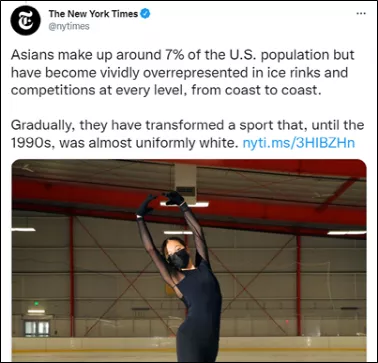"Asians make up 7 percent of the U.S. population, but their share of the ice sports world is overrepresented" and "they're reinventing the sport that has always been dominated by whites." ”
On February 10, the two forwarded introductions of the above two New York Times news triggered a heated discussion among the American people about Asian athletes.

To understand why these words will stimulate American netizens, we must first understand the "ecological niche" of Asian Americans in the field of public opinion. In the eyes of many Americans, Asians are generally diligent and self-disciplined, and as a whole, have higher average incomes and lower crime rates. But on the other hand, Asians are more willing than other ethnic groups to conform to the values of American society (dominated by whites), resulting in a lack of leaders in many industries.
However, Asians, who have always been regarded as "dull" and "weak", have rarely appeared in the American ice and snow sports industry in recent years a group of athletes with strong hands and self-confidence. So when Asians finally made their mark on what they weren't good at, the New York Times described them as "overrepresented," giving many readers the impression that if Asians just performed well in this line, you said "excessive," is this implying that Asians are only worthy of being a supporting role in American society forever?
Judging from the comments of American netizens, there are not a few people who feel this hint, and similar comments abound in the comment area.
However, after reading the original text of this report and the translation of the Chinese, the author has a very different view of this issue.
Judging from the whole text, the author feels that this report does not mean to "belittle Asians" as a whole, on the contrary, probably because the author of this article is also Asian, and his analysis angle also allows the report to dig out some interesting facts.
For example, from the name point of view, many outstanding Asian athletes are of Chinese descent and were attracted to the sport at a very young age, coupled with the hard-working family style of Chinese families and the great importance attached to the education of their children, laying the foundation for these athletes to conquer the national figure skating world.
In the eyes of the American people who advocate "freedom" and pursue a loose style, these factors that help Asian athletes succeed have always been the material for them to mock Asians as "boring" and "boring". The achievements of Asian-American athletes are a powerful response to their arrogant and implicit racist prejudices.
In addition, for the use of words in English, the author also responded to everyone in the follow-up, although most people still think that he should adjust the wording, but basically understand the original meaning he wants to express.
However, while the article does not deliberately disparage and discriminate against Asians, it intentionally or unintentionally exposes some of the mentality problems of the Asian American community.
First, the English title of the article literally translates as "Asian Americans' Rising Passage in Figure Skating," compared to the headline Chinese New York Times headline "Asian Americans Hold Up Half the Sky" for American Figure Skating." Compared with "half the sky", the "ascending channel" is suddenly divided into layers.
The phrase "overrepresentation," which is controversial in English, uses a more in-line wording in the Chinese version: "The proportion of Asians is significantly higher than that of other ethnic groups." This statement highlights both the achievements of Asians and the legitimacy of Asians occupying more positions in this field, rather than trembling and saying that they are "excessive".
As an American media that has attracted wide attention from the local people, the Chinese translation version of the New York Times report on this report is actually more accurate than the original English version, not only is the wording more accurate, but also has a little more "give up who I am" in the style, so that the temperament of the whole article is very different.
What is it that prevents the author of this article from accurately conveying this exuberant temperament in Chinese translation to American readers in English?
On the other hand, the author repeatedly mentions the prejudice of the figure skating world and American society against Asians, such as the athlete Chen Tingting, who is often called "Siamese cat" and "without emotion" by American journalists, and calls her "exotic beauty" in a vulgar and curious tone, such as another athlete who is assigned to learn "white etiquette class" to ensure his future development in a way that pleases white officials in the industry. In addition, violence against Asians in American society has also risen sharply some time ago.
However, for these infuriating discrimination and oppression, I do not know what the reason is, the author limits the way to solve these problems to "Asians prove themselves with efforts and achievements" and "try to express their culture and identity", rather than taking this opportunity to question the root causes of these injustices and call on Asians to unite and say "no" to them positively.
If the achievements of Asians in this field are real and irrefutable, why should they be surprised and uneasy because they have performed better than other ethnic groups in this area? If in the face of injustice and oppression, we can only think of "reflecting on ourselves and continuing to work hard", is this facing the problem or avoiding the problem?
In an article that should have cheered up Asian Americans, the author still inevitably brought with him a seemingly discouraging mentality: ashamed to admit his achievements and afraid to express his anger. This kind of mentality is probably more worthy of Asian American thinking than a misused word.
Author: Liang Youzhi